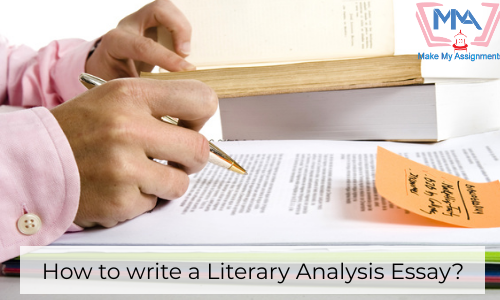
How to write a Literary Analysis Essay?
A literary analysis essay is a bit different from a general academic essay. Students are often assigned with such kind of analytical essays to enhance their reading, analytics and understanding skills. Writing analytical essays can help develop their skills, such as better research skills which is most useful in professional as well as personal life.
When we analyze the arguments made of literary work, we generally connote it as a literary analysis essay. Here, the writers are given the opportunity to explore events, places, characters, writing methods, tone, etc., involved in fictional, non-fictional, novel and drama stories. With the help of these essays, writers get to widen their questioning ability. For instance, they ask the readers why the author used a particular writing tone or style and certain symbols in his novel.
Therefore, we can define a literary analysis essay as something that intensely looks at various sections of literary work to help disclose whether they are relevant or what is their influence on complete work
Writing a literary analysis essay
A literary analysis essay consists of the following elements-
Introduction
Under this section, you need to include the author’s name, the title of the story, and an effective thesis statement. With the help of this statement, the readers get the complete idea about the essay, and they can quickly grasp what the essay wants to convey to them. Include more interrogative sentences in comparison to affirmative statements, as they have better influence.
Body
In each body paragraph, you must include an argument relevant to the thesis statement with the same perspective to maintain uniformity. You must give a detailed explanation of everything about your essay and don’t write anything using the narrative method. Rather, frame it on your own, depending upon your understanding of the topic. Each paragraph must end with a hook sentence so that you are able to convince the readers of your viewpoint. To elaborate things effectively, use transition words in your essay such as finally, evidently, conclude and so on.
Conclusion
You need to describe your thesis statement again in this section, but do not make the mistake of rewriting it. Instead, only provide a description. And in the end, complete your essay in a persuading tone.
Types of literary analysis essay
A literary analysis essay does not fall under a particular tone; instead, it comes with four types-
Theoretical analysis
This type includes various literary theories that can help analyze the literature work. These theories are further used to compare ideas against each other that too separately. Thus, it helps the readers get a comprehensive picture.
Close reading analysis
This type majorly focuses on paying considerable attention to each detail included in the essay. If you want to add any specific words or sounds to your content, you can use this type for writing. It will help the readers understand your psyche and provide them with the right knowledge and information.
Historical analysis
When you lean on the past for the evolution of a study, you perform a history check on the background information that involves deep research. As this historical background can be half a century old, you might find it difficult to compile one. So, in that case, you need to refer to a minimum of one sample that is related to the topic.
Comparative analysis
Under this type, you compare two different literary texts. For instance, you compare two separate studies and then examine the methods adopted in this literature type.
Though it can be hard for students to write an effective literary analysis essay, if done with great dedication and focus can inculcate better results. All you need is a bit of practice and the right resources and tools. Apart from this, if you ever need help regarding your academic essays or assignments, feel free to contact our online essay writing services for professional help and guidance.




